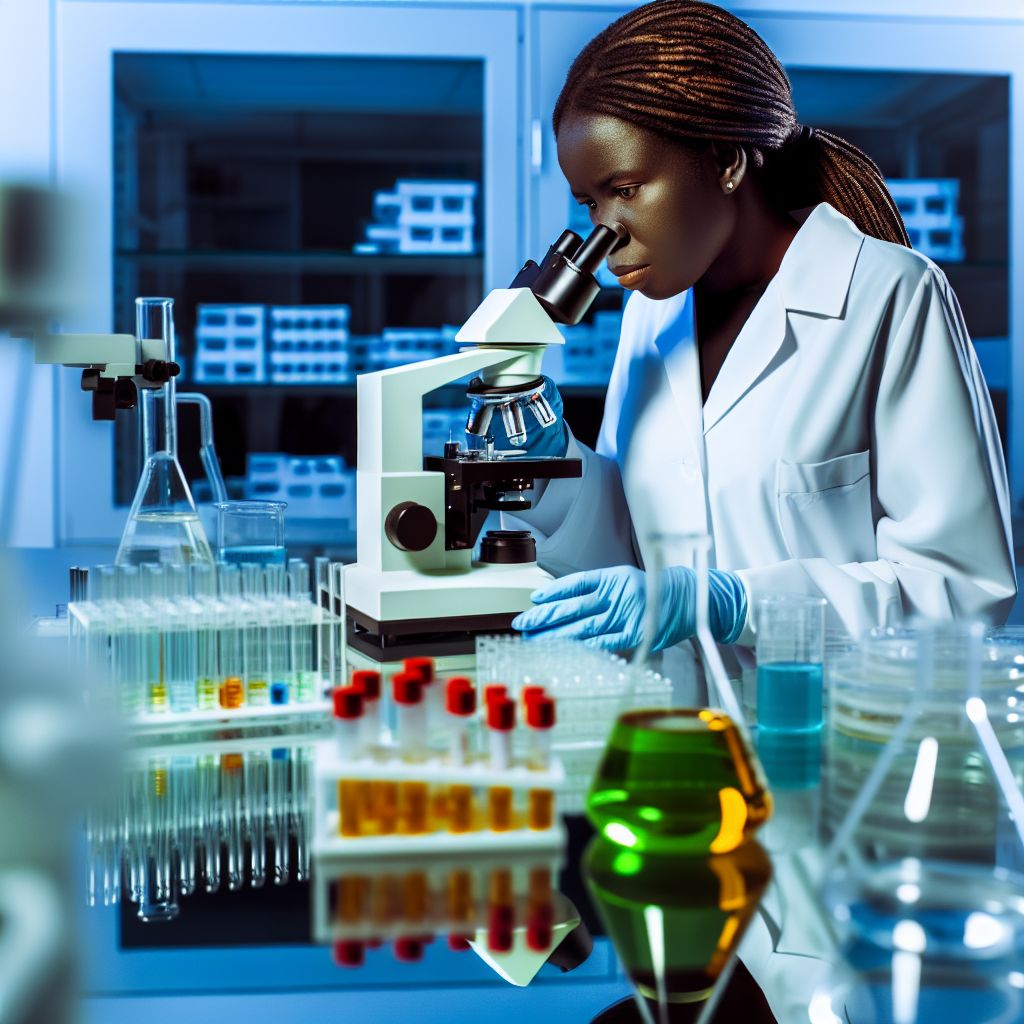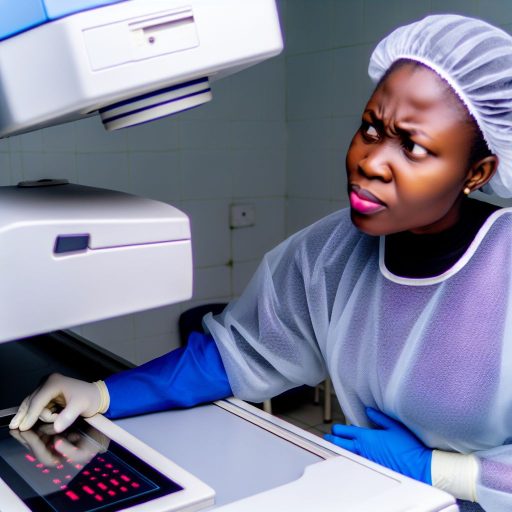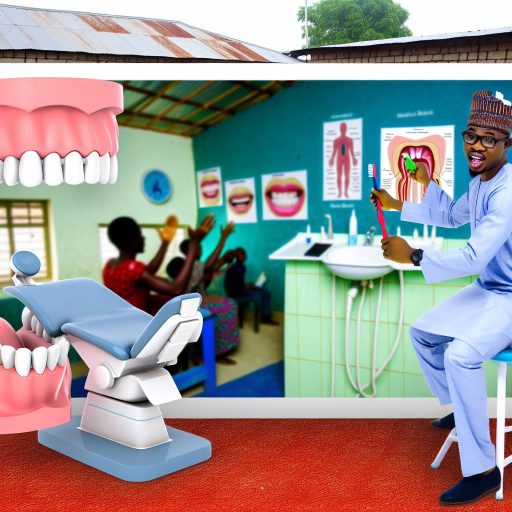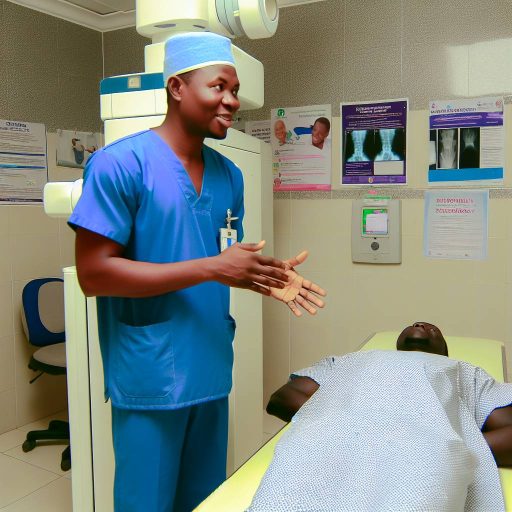Importance of Medical Laboratory Science
Medical laboratory professionals play a crucial role in the detection, diagnosis, and treatment of diseases.
Career Opportunities in Medical Laboratory Science
There are various career opportunities available in the field of medical laboratory science.
- Medical Laboratory Technicians
- Clinical Laboratory Scientists
- Pathologists
These professionals perform tests and procedures that aid physicians in diagnosing and treating diseases.
These professionals conduct complex tests, analyze results, and help in the interpretation of data.
Pathologists are physicians who specialize in diagnosing diseases through examination of body tissues and fluids.
According to the Bureau of Labor Statistics, employment of medical laboratory technologists and technicians is projected to grow 7% from 2019 to 2029.
Education and Training Requirements:
In order to become a medical laboratory scientist, individuals must complete a bachelor’s degree program in medical laboratory science or a related field.
- Students should focus on coursework in biology, chemistry, microbiology, and mathematics to build a strong foundation in the sciences.
- Some programs may also require courses in statistics, biochemistry, and genetics to provide a well-rounded education.
After completing their degree, aspiring medical laboratory scientists must also complete a clinical internship or hands-on training program to gain practical experience in the field.
- During their internship, students will work under the supervision of experienced professionals to learn essential laboratory techniques and procedures.
- Internships are a valuable opportunity for students to apply their classroom knowledge to real-world situations and develop their skills.
Once all educational and training requirements are met, individuals can pursue certification and licensure to practice as a medical laboratory scientist.
- Certification is typically required by most employers and can be obtained through organizations such as the American Society for Clinical Pathology (ASCP) or the National Credentialing Agency for Laboratory Personnel (NCA).
- Licensure requirements vary by state, so it is important for aspiring medical laboratory scientists to research the specific requirements in their state.
Job responsibilities:
Performing various laboratory tests to provide accurate and timely results.
Conducting research to develop new testing methods and improve existing techniques.
Analyzing samples, interpreting data, and documenting findings for healthcare providers.
Operating and maintaining laboratory equipment to ensure accurate and reliable results.
Collaborating with healthcare professionals to determine appropriate testing protocols.
Accuracy and attention to detail are essential in the role of a medical laboratory scientist.
Mistakes in testing or analysis can have serious consequences for patient diagnosis and treatment.
It is crucial for laboratory scientists to follow strict protocols and procedures to ensure precise results.
Settings for medical laboratory scientists:
- Hospitals: Medical laboratory scientists play a crucial role in diagnosing and treating patients in hospital settings.
- Clinics: Many outpatient clinics rely on laboratory testing to assist with patient care and monitoring.
- Research labs: Medical laboratory scientists may work in research settings to develop new testing methods and technologies.
- Pharmaceutical companies: Some laboratory scientists are involved in drug development and testing processes.
- Public health agencies: Medical laboratory scientists can work in government agencies to monitor and control disease outbreaks.
Medical laboratory scientists have a wide range of job opportunities and can make a significant impact on patient care and public health.
Their work is vital in ensuring accurate diagnoses and effective treatments for various medical conditions.
Uncover the Details: Volunteer Opportunities for Dietitians in Nigeria
Specializations:
Medical Laboratory Science offers various specializations to cater to different aspects of healthcare.
Each specialization requires specific skills and knowledge to excel in the field.
Here are some of the key specializations within Medical Laboratory Science:
- Clinical Chemistry:
Clinical chemists analyze body fluids to assess a patient’s health and diagnose diseases.
They need to have a strong understanding of biochemistry and the ability to operate complex laboratory equipment.
Advanced certifications such as ASCP’s Chemistry Specialist certification can lead to specialized roles in this field.
- Hematology:
Hematologists focus on studying blood and the disorders associated with it.
They analyze blood samples to detect abnormalities and diagnose blood-related diseases like anemia and leukemia.
Strong analytical and problem-solving skills are essential for this specialization.
Advanced degrees in Hematology or certifications like the Hematology Technologist (HT) credential can enhance career opportunities in this area.
- Microbiology:
Microbiologists study microorganisms such as bacteria, viruses, and fungi.
They play a crucial role in identifying infectious diseases and helping to develop treatments.
A profound knowledge of microbiology, strong attention to detail, and critical thinking skills are essential for microbiologists.
Special certifications in Microbiology or Molecular Diagnostics can open doors to specialized positions in this field.
- Immunohematology (Blood Banking):
Immunohematologists focus on analyzing blood for transfusion purposes and managing blood donor programs.
They ensure that blood transfusions are safe for patients and compatible with their blood type.
Attention to detail, strong organizational skills, and the ability to work under pressure are crucial in this specialization.
Advanced certifications such as SBB (Specialist in Blood Bank) can help individuals advance their careers in Immunohematology.
- Genetics:
Geneticists analyze genetic information to diagnose genetic disorders and provide counseling to patients.
They work closely with healthcare providers to develop personalized treatment plans based on genetic testing.
Strong knowledge of genetics, excellent communication skills, and empathy are essential for geneticists.
Advanced degrees in Human Genetics or Genetic Counseling Certification can lead to specialized positions in Genetic Testing Laboratories.
Choosing a specialization in Medical Laboratory Science allows professionals to focus on a specific area of expertise and contribute to advanced patient care.
By acquiring specialized skills and knowledge, individuals can pursue advanced certifications or degrees that will open doors to exciting career opportunities in the field.
Explore Further: Impact of Nursing Science on Public Health
Salary and Job Outlook
Medical laboratory scientists are essential members of the healthcare team.
They work behind the scenes to perform complex tests that help doctors diagnose and treat patients.
This profession offers competitive salaries and promising job growth prospects.
It is an attractive career option for individuals interested in science and healthcare.
Average Salary Range for Medical Laboratory Scientists
- The average salary range for medical laboratory scientists varies depending on factors such as experience, location, and level of education.
- According to the Bureau of Labor Statistics, the median annual wage for medical laboratory scientists was $54,180 in May 2020.
- Entry-level medical laboratory scientists may start at a lower salary, while those with several years of experience or advanced degrees can earn significantly higher pay.
- Medical laboratory scientists working in research or pharmaceutical industries tend to earn higher salaries compared to those working in hospitals or clinics.
Job Outlook and Growth Prospects
- The job outlook for medical laboratory scientists is projected to grow 7% from 2019 to 2029.
- This growth is driven by an aging population, which will lead to an increased demand for medical services, including diagnostic testing.
- Advancements in medical technology and the development of new tests also contribute to the growth of this field.
- Medical laboratory scientists with specialized training or certifications, such as in molecular diagnostics or cytotechnology, may have better job prospects.
Factors Impacting Salary and Job Opportunities
- Location plays a significant role in determining salary for medical laboratory scientists, with major metropolitan areas typically offering higher pay.
- Experience levels also influence salary, with seasoned professionals commanding higher salaries than entry-level scientists.
- Specialized certifications or additional training can lead to increased job opportunities and higher earning potential.
- Networking and staying up-to-date with advancements in the field can also enhance career prospects for medical laboratory scientists.
Overall, a career in medical laboratory science offers a competitive salary, job security, and opportunities for growth and advancement.
Individuals pursuing this profession can look forward to a fulfilling and rewarding career in the healthcare industry.
Explore Further: Introduction to Radiology: Career Path in Nigeria

Advancement opportunities:
Medical laboratory scientists have numerous career advancement opportunities available to them.
These opportunities allow professionals in this field to grow in their careers and take on more challenging and rewarding roles.
Laboratory Manager:
- One common career advancement path for medical laboratory scientists is to become a laboratory manager.
- As a laboratory manager, professionals are responsible for overseeing the daily operations of a medical laboratory.
- They may manage staff, budgets, equipment maintenance, and ensure compliance with regulations and quality standards.
Research Scientist:
- Another career advancement option is to transition into a role as a research scientist.
- Research scientists in medical laboratory science conduct experiments, analyze data, and contribute to the advancement of knowledge in the field.
- They may work in academic institutions, government agencies, or private research organizations.
Educator:
- Medical laboratory scientists can also pursue a career in education as an educator.
- As an educator, professionals may teach in academic programs, train new laboratory technicians, or develop continuing education courses for practicing professionals.
- They play a crucial role in shaping the next generation of medical laboratory scientists.
Additional certifications and continuing education:
- To advance in their careers, medical laboratory scientists can obtain additional certifications in specialized areas of the field.
- These certifications demonstrate expertise and commitment to ongoing professional development.
- Continuing education options, such as workshops, seminars, and online courses, can also help professionals stay current and grow in their careers.
Find Out More: Nigerian Dental Schools Offering Oral Biology Programs
Professional organizations and networking
Joining professional organizations is crucial for medical laboratory scientists as it offers a range of benefits.
These organizations provide a platform for professionals in the field to connect, collaborate, and stay updated on industry trends and advancements.
- Professional organizations offer opportunities for continuing education and professional development.
- Members gain access to resources such as research journals, online forums, and job boards.
- Networking with peers in the field can lead to new job opportunities, mentorship, and collaboration on research projects.
Networking with other medical laboratory scientists allows professionals to exchange insights, best practices, and experiences.
This can help in fostering personal growth and enhancing professional skills.
Transform Your Career with Expert Guidance
Get personalized mentorship consulting that’s tailored to your unique path. Our expert advice is actionable and exclusive.
Get Started- Collaborating with peers can lead to innovative research projects and publications.
- Networking can also offer emotional support and camaraderie within the profession.
Attending conferences and events specifically tailored for medical laboratory scientists is a great way to network and learn from industry leaders.
These events often feature keynote speakers, workshops, and poster presentations, providing opportunities for professionals to stay abreast of the latest developments in the field.
- Conferences offer a platform to showcase research findings and receive feedback from peers.
- Professional networking events during conferences can lead to valuable connections and collaborations.
- Learning from experts in the field can help professionals broaden their knowledge and skills.
Career Opportunities in Medical Laboratory Science
The field of medical laboratory science offers a wide range of exciting career opportunities.
From working in hospitals and clinics to research facilities and forensic labs, the options are diverse.
Individuals can make a real difference in the lives of patients by helping diagnose and treat diseases.
The demand for skilled professionals in this field continues to grow.
People interested in science, medicine, and technology should consider a career in medical laboratory science.
Many paths are available within the field, from clinical laboratory scientist to molecular biologist.
If you are intrigued by the idea of working in a lab setting and contributing to the healthcare industry, research programs and speak with professionals in the field.
Take the first step towards a rewarding career in medical laboratory science today!
Additional Resources
Bachelor of Science in Medical Laboratory Science | MLT-to-MLS
Medical Laboratory Scientist – Explore Health Care Careers – Mayo …




